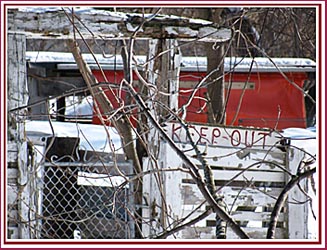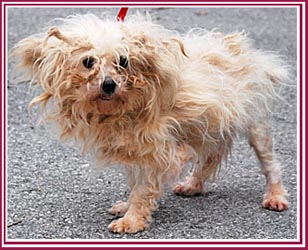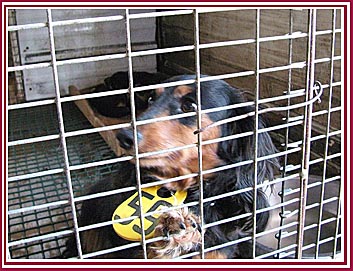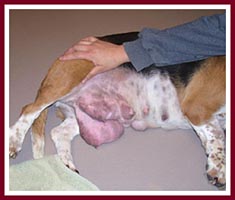| |
 |
Editor's note: Except for Wisconsin and a few other
states, when a petstore brags that they sell "only dogs from licensed
sources," it is very likely that the USDA is the sole licensing
agency. All of the dogs pictured on this page were from USDA-
licensed facilities, as was the Keep Out photo.
If you bought an
Italian Greyhound at a petstore, this might have been his father. Teddy was a
puppymill stud. He only had one eye, and his teeth were so infected that they
had rotted away part of his jaw. When he was thrown away at age 6, he came to
rescue wtih an untreated, badly broken leg.
BUT THAT'S
OK, the breeder tells us with a wink; he more than got his money's
worth out of a defective pup by putting him to work producing puppies himself.
After all, you don't need two eyes, all your teeth, or four legs to make
puppies.
|
|
| |
USDA
Covering Up Abuses at Puppy Mills * USDA Aiding and Abetting Cruel Puppy
Mills * What You Can
Do
|
| |
 USDA Covering Up Abuses at Puppy Mills: Undermining the Animal
Welfare Act USDA Covering Up Abuses at Puppy Mills: Undermining the Animal
Welfare Act
 The United States
Department of Agriculture (USDA), the agency responsible for enforcing the
federal Animal Welfare Act (AWA), is greatly disturbed by the fact that state
legislators and local government officials have been enacting their own laws
and regulations against puppy mills. More than 250 municipalities have now
banned the sale of pet store puppies; two states, California and Maryland, have
enacted statewide bans on the sales of dogs in pet stores, and seven states and
several municipalities, including New York City, have imposed restrictions on
pet stores to ensure that they are not sourcing dogs from inhumane breeders. The United States
Department of Agriculture (USDA), the agency responsible for enforcing the
federal Animal Welfare Act (AWA), is greatly disturbed by the fact that state
legislators and local government officials have been enacting their own laws
and regulations against puppy mills. More than 250 municipalities have now
banned the sale of pet store puppies; two states, California and Maryland, have
enacted statewide bans on the sales of dogs in pet stores, and seven states and
several municipalities, including New York City, have imposed restrictions on
pet stores to ensure that they are not sourcing dogs from inhumane breeders.
USDA
believes that such state and local restrictions are seriously affecting the
economic viability of the commercial dog breeding industry. In response, USDA
initiated steps to enhance the image of puppy mills a few years ago by covering
up violations of the AWA at puppy mills. USDA defended its actions by
explaining that “we need to enable breeders to sell their dogs to pet
stores…[and] citing violations is an impediment to such sales.”
This
past year, USDA has ramped up its efforts to conceal poor conditions at puppy
mills amid mounting concerns about the continuing bad reputation of the
industry. USDA is determined to paint an idyllic picture of the dog breeding
industry regardless of the deplorable conditions at puppy mills and the neglect
and abuse inflicted upon puppy mill dogs. In an effort to conceal
violations of the federal law to protect dogs, USDA has blocked public access
to inspection reports and refuses to comply with the Freedom of Information Act
(FOIA). The Agency has additionally devised new policies to keep violations
from being documented on USDA inspection reports.
The
Missouri Alliance for Animal Legislation has listed below the numerous policy
changes that USDA has instituted to help cover-up substandard conditions at dog
breeding facilities.
Failure to comply with the Freedom of Information Act --
When the Agency responds to FOIA requests for copies of
inspection reports of dog breeding operations, the Agency blackens out the
entire report, the excuse being that such reports are equivalent to
personnel and medical records which are exempt from FOIA.
“Teachable Moments” -- Certain
violations are no longer to be documented on the inspection reports but are
instead to be treated as “teachable moments” that are to be
documented separately (out of public view).
Self-Identifying and Self-Reporting -- If
the breeder informs USDA of his/her violations of AWA and makes a promise to
correct them, the Agency’s inspector will not document the violations on
the inspection report.
Limited Inspections -- USDA will now
inspect only those kennel buildings and dogs that the breeder consents to let
USDA inspect and will document violations only in areas permitted by the
breeder.
Announced Inspections -- USDA has
implemented a “pilot project” to evaluate the use of
“announced” inspections whereby USDA calls the breeder in advance and
schedules an appointment for the inspection. USDA plans a nationwide
implementation of this announced inspections policy if such warnings result in
reduced violations during the pilot project.
Limitations on Number of Non-Compliant Items --
The Agency is limiting the number of non-compliant items that
can be cited by an inspector to one per category of regulations. For example,
if 10 dogs are sick and/or injured and have been denied veterinary care, the
breeder can be cited for only one non-compliant item for lack of veterinary
care even if all 10 dogs are suffering.
Identification of Suffering Animals No Longer Necessary
-- The section on how to identify suffering animals has been
eliminated from USDA’s Inspection Guide.
Veterinarian Oversight No Longer Necessary --
The requirement to ensure oversight by a veterinarian has been
eliminated from USDA’s Inspection Guide.
Preventive Veterinary Care No Longer Necessary --
The requirement for care by a veterinarian to provide
vaccinations and parasite control has been eliminated from USDA’s
Inspection Guide.
Ignoring of Serious Conditions in Dogs --
Infected or rotting teeth, overgrown toenails that curl into the
pads of feet, eye and ear infections, and other so-called “minor”
illnesses and injuries are no longer to be documented by USDA.
Elimination of All Incentives to Provide Veterinary Care
on a Continuing Basis -- If the inspector is able to contact the
breeder’s veterinarian about sick and injured dogs discovered during the
inspection, then no violation is documented regardless of how much the
animals have suffered and how long they have gone without treatment.
Reporting of Criminal Abuse and Neglect No Longer --
USDA inspectors are prohibited from reporting abuse and neglect
discovered during the inspection process to the appropriate law enforcement
authorities.
No
Unannounced Inspection to Take Place If the Breeder Objects --
USDA will now accept any number of excuses for a refusal, which
can be as general as the breeder having a “personal event” to attend.
Instead, USDA will schedule an inspection appointment in advance if a breeder
continues to refuse unannounced inspections.
Bernadette
Juarez, USDA Deputy Administrator for Animal Care, was concerned that too many
violations were being documented on USDA inspection reports detailing
breeders’ failure to provide proper veterinary care to their dogs. In
response, Juarez eliminated numerous veterinary care requirements and now
boasts that 70% of commercial dog breeders have zero non-compliant items on
their inspection reports.
|
| |
Top
|
| |
 USDA Aiding and Abetting Cruel Puppy Mills USDA Aiding and Abetting Cruel Puppy Mills
 USDA is not only
conspiring with the dog breeding industry to cover-up abuses at puppy mills but
is also actively aiding and abetting puppy millers as they attempt to evade
state and local laws. In addition, USDA is blatantly violating the federal
Freedom of Information Act and is instructing its inspectors to falsify federal
documents in order to hide substandard conditions at puppy mills. USDA is not only
conspiring with the dog breeding industry to cover-up abuses at puppy mills but
is also actively aiding and abetting puppy millers as they attempt to evade
state and local laws. In addition, USDA is blatantly violating the federal
Freedom of Information Act and is instructing its inspectors to falsify federal
documents in order to hide substandard conditions at puppy mills.
Summary of USDA’s Criminal Malfeasance
Aiding and abetting substandard dog breeders in
circumventing state and municipal laws.
Seven states, along
with numerous municipalities (including New York City), have enacted laws that
prohibit pet stores from purchasing puppies from any dog breeder who has a
certain number of direct and indirect non-compliant items on their inspection
reports. These statutes have greatly inhibited the ability of inhumane breeders
to sell their dogs.
In response to
complaints from the scofflaws in the industry concerning these state and local
laws, USDA announced a few years ago that its inspectors would no longer cite
many non-compliant items on inspection reports but would instead refer to them
as “teachable moments.” Since that time, USDA has enacted additional
policies that are intended to cover-up conditions at substandard breeders’
facilities and allow them to circumvent state and local laws.
USDA has defended
these policies by claiming that the Agency needs to limit the number of
non-compliant items on inspection reports; the argument given is that
“we need to enable breeders to sell their dogs to pet stores…[and]
citing violations is an impediment to such sales.” This raises the
issue of whether the federal government should engage in the practice of aiding
and abetting AWA violators in circumvention of state and local statutes.
Forcing USDA inspectors to falsify federal documents
(inspection reports) and to conceal material facts both of which are violations
of 18. U. S. C. § 1001.
Currently, when a
USDA inspector utilizes the “teachable moment” policy, or ignores
violations in accord with self-reporting or other recently changed policies,
the inspector makes the following notation on the official inspection report:
“No non-compliant items.” Then the inspector documents, either on a
separate “teachable moment” document, or in his/her field notes, the
specific non-compliant items discovered during the inspection.
Federal law (18. U.
S. C § 1001) specifies that it is a crime to falsify a federal document or
conceal any material fact. A criminal offense is therefore being committed
every time a USDA inspector documents on a federal inspection report that there
are “no non-compliant items” at a breeding facility when that
inspector knows full well that there is at least one non-compliant item at the
facility, and in fact, makes a written record of such non-compliance either on
a separate USDA document (“teachable moment” form) or in his/her
field notes.
The purpose of the
“teachable moment” policy, the “self-inspection” policy,
and other recently adopted USDA policies is to provide misleading and false
information to state and local government officials and to the public. A
government official who knowingly makes use of false documents or makes any
“false representation” is also in violation of 18. U. S. C. §
1001 – a crime punishable by up to five years in prison.
Violating provisions of the Freedom of Information Act
(FOIA).
USDA is refusing to
provide copies of inspection reports of dog breeding facilities, and when they
do comply with a request for such a report, USDA blackens out the entire
report. These redactions completely obscure the findings of USDA inspectors and
are a deliberate FOIA violation, the Department’s sole purpose being to
protect inhumane puppy mills. USDA is in effect denying state officials,
municipal authorities, and animal advocates the ability to ascertain whether
any violations are occurring at dog breeding facilities.
This is another
effort – and the most ruthlessly effective to date – to help
substandard breeders circumvent state and local laws. These redactions render
such state and local laws meaningless, since state officials have no way to
determine the conditions at dog breeding facilities that sell dogs to pet
stores within their jurisdictions. USDA justifies its redactions by arguing
that Exemption 6 of FOIA permits the government to withhold “personnel and
medical files and similar files” when their disclosure “would
constitute a clearly unwarranted invasion of personal privacy.”
Inspection reports of conditions at dog breeding facilities are in no way
similar to “personnel and medical files.”
|
| |
Top
|
| |
 What You Can
Do: Speak Out for the Animals! What You Can
Do: Speak Out for the Animals!
 Dogs don't vote, so it is
vital that YOU be their voice. The reason that USDA is relaxing their efforts
is a simple one: Pressure is being exerted on them by puppy- millers and other
agricultural interest groups. It is crucial that we drownout the voices of the
puppy- millers and make sure our government officials know both that we care
about animals and that we vote! Let them know that you will not tolerate the
government turning a blind eye to cruelty. Dogs don't vote, so it is
vital that YOU be their voice. The reason that USDA is relaxing their efforts
is a simple one: Pressure is being exerted on them by puppy- millers and other
agricultural interest groups. It is crucial that we drownout the voices of the
puppy- millers and make sure our government officials know both that we care
about animals and that we vote! Let them know that you will not tolerate the
government turning a blind eye to cruelty.
Please contact U. S. Secretary of Agriculture Sonny
Perdue! Please tell Secretary Perdue to stop covering up abuses
at puppy mills and conspiring with the dog breeding industry to circumvent
state and local laws. Make Secretary Perdue aware of the fact that his Agency
is committing gross malfeasance and criminal acts in furtherance of its
practice of aiding and abetting cruel dog breeders. Insist that Secretary
Perdue direct inspectors to stop falsifying federal documents and to stop
concealing material facts in order to hide substandard conditions at puppy
mills from public scrutiny.
 Phone: (202) 720-3631 Phone: (202) 720-3631  email
AgSec@usda.gov email
AgSec@usda.gov 
Then contact USDA'S Deputy Administrator of Animal Care
Bernadette Juarez. Deputy Administrator Juarez is the person
responsible for USDA's efforts to cover up abuses in order to keep the public
in the dark about neglect at puppy mills. Ms. Juarez believes that she is
helping the industry by covering up for inhumane breeders. Please tell Ms.
Juarez that if she sincerely wants to improve the image of the dog breeding
industry, she needs to rid the industry of the bad breeders. Let her know that
aiding and abetting bad breeders not only hurts the animals but blemishes the
image of the entire industry.
 Phone: (301) 851-2735 Phone: (301) 851-2735  email
bernadette.r.juarez@aphis.usda.gov email
bernadette.r.juarez@aphis.usda.gov

We also need you to reach out to your federal
legislators. It is crucially important that our lawmakers press
federal agriculture department personnel to perform their official duties and
effectively enforce the animal welfare laws that have been passed by the U.S.
Congress. To find your elected officials,
please click here: To
find your US Senator, please click here.
Your phone calls,
emails, and letters to public officials assuredly DO make a difference. Please
don't let the animals down!
[Editor's Note: We know that
feelings run high when talking about animal abuse in puppy mills. As always, we
urge you PLEASE to be respectful and courteous! Name-calling, and rude or
abusive letters will hurt, rather than help, our cause. ]
|
| |
Top
|
| |
|
 Additional info on USDA/ Animal Welfare Act: Additional info on USDA/ Animal Welfare Act:
|
Home * About
WPMP * Contact Us * Site
Search * Donate
What is a Puppy
Mill? * Puppy Mill Survivors * Photo
Album * The Petstore Connection
Dog
Auctions * Animal
Hoarding * What YOU Can Do
Laws/Legislation * Act 90/S.173.41/ WI Dog Program
* Filing a Complaint Against a WI Dog Seller
Guide to Finding a
Pet * Breeders With Pride * Rehoming: Free To Good Home?
©
Page Copyright, 2018. The Wisconsin Puppy MIll Project
P.O. Box 926 * Sheboygan, WI
53082-0926 * info@NoWisconsinPuppyMills.com
Articles ©2018 , The
Alliance Speaks, Missouri
Alliance for Animal Legislation,. Reprinted with Permission.
Teddy Photo © Copyright, 2007, Carol Sumbry;
Midwest Italian
Greyhound Rescue. Used by Permission.
Mill Photos © Copyright F. Menish. All Rights Reserved. Used with
permission.
Thorp Photos Copyright 2007, by the Wisconsin Puppy Mill Project. All Rights
Reserved. Used with permission.
Website design by
Hook & Web
Designs
|



 The United States
Department of Agriculture (USDA), the agency responsible for enforcing the
federal Animal Welfare Act (AWA), is greatly disturbed by the fact that state
legislators and local government officials have been enacting their own laws
and regulations against puppy mills. More than 250 municipalities have now
banned the sale of pet store puppies; two states, California and Maryland, have
enacted statewide bans on the sales of dogs in pet stores, and seven states and
several municipalities, including New York City, have imposed restrictions on
pet stores to ensure that they are not sourcing dogs from inhumane breeders.
The United States
Department of Agriculture (USDA), the agency responsible for enforcing the
federal Animal Welfare Act (AWA), is greatly disturbed by the fact that state
legislators and local government officials have been enacting their own laws
and regulations against puppy mills. More than 250 municipalities have now
banned the sale of pet store puppies; two states, California and Maryland, have
enacted statewide bans on the sales of dogs in pet stores, and seven states and
several municipalities, including New York City, have imposed restrictions on
pet stores to ensure that they are not sourcing dogs from inhumane breeders.
 USDA is not only
conspiring with the dog breeding industry to cover-up abuses at puppy mills but
is also actively aiding and abetting puppy millers as they attempt to evade
state and local laws. In addition, USDA is blatantly violating the federal
Freedom of Information Act and is instructing its inspectors to falsify federal
documents in order to hide substandard conditions at puppy mills.
USDA is not only
conspiring with the dog breeding industry to cover-up abuses at puppy mills but
is also actively aiding and abetting puppy millers as they attempt to evade
state and local laws. In addition, USDA is blatantly violating the federal
Freedom of Information Act and is instructing its inspectors to falsify federal
documents in order to hide substandard conditions at puppy mills. Dogs don't vote, so it is
vital that YOU be their voice. The reason that USDA is relaxing their efforts
is a simple one: Pressure is being exerted on them by puppy- millers and other
agricultural interest groups. It is crucial that we drownout the voices of the
puppy- millers and make sure our government officials know both that we care
about animals and that we vote! Let them know that you will not tolerate the
government turning a blind eye to cruelty.
Dogs don't vote, so it is
vital that YOU be their voice. The reason that USDA is relaxing their efforts
is a simple one: Pressure is being exerted on them by puppy- millers and other
agricultural interest groups. It is crucial that we drownout the voices of the
puppy- millers and make sure our government officials know both that we care
about animals and that we vote! Let them know that you will not tolerate the
government turning a blind eye to cruelty.